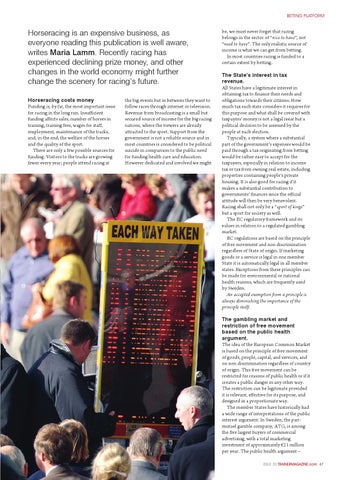BETTING PLATFORM ISSUE 30.qxd:Jerkins feature.qxd
20/5/10
20:07
Page 2
BETTING PLATFORM
Horseracing is an expensive business, as everyone reading this publication is well aware, writes Maria Lamm. Recently racing has experienced declining prize money, and other changes in the world economy might further change the scenery for racing’s future. Horseracing costs money Funding is, by far, the most important issue for racing in the long run. Insufficient funding affects sales, number of horses in training, training fees, wages for staff, employment, maintenance of the tracks, and, in the end, the welfare of the horses and the quality of the sport. There are only a few possible sources for funding. Visitors to the tracks are growing fewer every year; people attend racing at
the big events but in between they want to follow races through internet or television. Revenue from broadcasting is a small but secured source of income for the big racing nations, where the viewers are already attracted to the sport. Support from the government is not a reliable source and in most countries is considered to be political suicide in comparison to the public need for funding health care and education. However dedicated and involved we might
be, we must never forget that racing belongs in the sector of “nice to have”, not “need to have”. The only realistic source of income is what we can get from betting. In most countries racing is funded to a certain extent by betting. The State’s interest in tax revenue. All States have a legitimate interest in obtaining tax to finance their needs and obligations towards their citizens. How much tax each state considers it requires for this purpose and what shall be covered with taxpayers’ money is not a legal issue but a political decision to be assessed by the people at each election. Typically, a system where a substantial part of the government’s expenses would be paid through a tax originating from betting would be rather easy to accept for the taxpayers, especially in relation to income tax or tax from owning real estate, including properties containing people’s private housing. It is also good for racing if it makes a substantial contribution to governments’ finances since the official attitude will then be very benevolent. Racing shall not only be a “sport of kings” but a sport for society as well. The EC regulatory framework and its values in relation to a regulated gambling market. EC regulations are based on the principle of free movement and non discrimination regardless of State of origin. If marketing goods or a service is legal in one member State it is automatically legal in all member states. Exceptions from these principles can be made for environmental or national health reasons, which are frequently used by Sweden. An accepted exemption from a principle is always diminishing the importance of the principle itself. The gambling market and restriction of free movement based on the public health argument. The idea of the European Common Market is based on the principle of free movement of goods, people, capital, and services, and on non discrimination regardless of country of origin. This free movement can be restricted for reasons of public health or if it creates a public danger in any other way. The restriction can be legitimate provided it is relevant, effective for its purpose, and designed in a proportionate way. The member States have historically had a wide range of interpretations of the public interest argument. In Sweden, the parimutuel gamble company, ATG, is among the five largest buyers of commercial advertising, with a total marketing investment of approximately €21 million per year. The public health argument – ISSUE 30 TRAINERMAGAZINE.com 47
